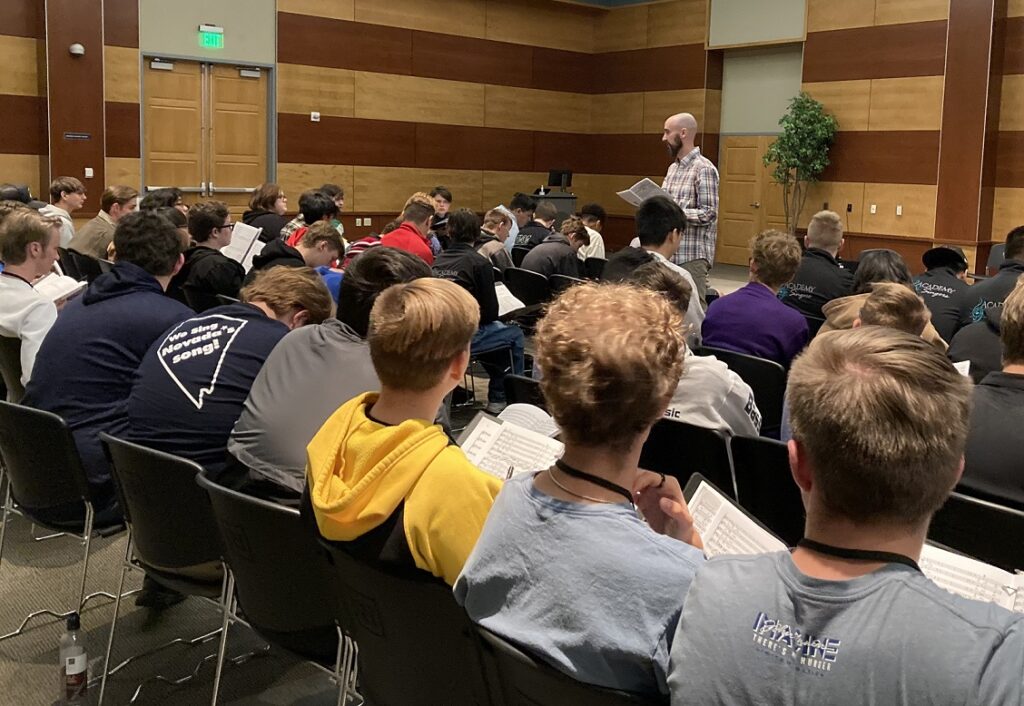Tagged Under:
Essential Tips for First-Year Music Educators
The 2024 “40 Under 40” educators offer must-do and must-try tips to new music teachers to help them through their first year of teaching.
Are you just embarking on your career as a music educator? It’s an exciting time, but you’re undoubtedly stressed and nervous at the prospect of establishing your own program and connecting with your students. We asked some top music educators — the Yamaha “40 Under 40” class of 2024 — for their top three tips for new music teachers.
THE YAMAHA EDUCATOR NEWSLETTER: Sign up to receive real-world advice, tips and instrument guides!
Below are over 115 tips that will help you navigate your first year of teaching.
 Dr. Angela Ammerman
Dr. Angela Ammerman
Adjunct Professor of Music Education
George Mason University
Fairfax, Virginia
1. Assume that all your students already like you. Don’t spend another minute worrying about whether students like you, or whether you should do more to make them like you. They do like you!
2. Stop talking so much! Students join your class to make music. As much as they love hearing about you, we want them to love making music together even more!
3. Make sure every student gets to perform in a concert at least once a year. Even if you do an “informance,” get those kids on a stage, praise their progress and let them show off the hard work that they have been doing!
 Dr. Tigran Arakelyan
Dr. Tigran Arakelyan
Music Director, Tacoma Music Collaborative
Executive Director, Music Works Northwest
Washington
1. Show students that you care about them and how passionate you are about the music you are working on. Music is beyond the notes. What makes you excited about that measure? What is special about a phrase or a theme? What are the conversations happening between the winds, strings and percussion? Who is the composer and why did they compose the piece? How does it relate to them today? You won’t excite every single student but if you are passionate, they will at least consider going on that journey with you.
2. Get to know your students. It won’t happen over night, but know their names, ask them to share, try to remember something that they are passionate about.
3. Think about the teachers who were most inspiring to you, and the colleagues who do exceptional work. What excited you when you were a music student in band, orchestra or choir? What inspired you when observing a colleague or a mentor teach? Plans and curriculum are great, but you must be flexible and learn to adapt.
 Jeremy Bartunek
Jeremy Bartunek
Music Teacher and Children’s Choir Director
Greenbriar School, Northbrook District 28
Northbrook, Illinois
1. Everything takes longer than you think. Make contingency plans. It’s better if you are fully prepared for the concert two weeks early because something always comes up.
2. Don’t get an advanced degree until you have a few years of experience. You don’t know what you don’t know.
3. Teaching music is a very public-facing role and involves a lot of public leadership. You will be looked to for answers (even non-music related ones) more often than you think. Improve your leadership and public-speaking skills.
 Dr. Benjamin Bergey
Dr. Benjamin Bergey
Assistant Professor of Music
Eastern Mennonite University
Harrisonburg, Virginia
1. Ask questions, seek help/guidance and know that you’re not alone. We don’t do this work alone, so find and reach out to mentors, others through professional memberships, etc.
2. Write out your desires for classroom culture along with your educational/pedagogical philosophy. Making music is a vulnerable act, so students need to feel safe and valued in a music classroom to be able to fully engage.
3. Breathe. It can be stressful to start a new job, and it’s easy to get sucked into everything and lose perspective (or one’s health). I am a big proponent of mindfulness; find practices that help you remain grounded and healthy so that you can do this for the long haul. Remember, it’s OK if you don’t get it right the first year. Progress over perfection.
 Adam Bodony
Adam Bodony
Assistant Professor and Director of Orchestras, Purdue University
Artistic Director, Indianapolis Youth Orchestra
Indiana
1. This is so cliché, but never give up. If you know that this is what you’re supposed to do, you’re bound to encounter obstacles that make you think, “Should I give up?” Never give up. Keep fighting, not just for yourself, but for all those who stand to learn from you in the future. The future of our profession depends on its future leaders loving what they do. If you love music and people, you will continue on this amazing journey of music and love, and you will pass it on to the next generation.
2. Knowledge is power. Read, learn, seek out more. Get into the nitty-gritty of your profession.
3. Cultivate positive relationships with other people in your profession. Always be kind, respectful and supportive. Don’t hold grudges, don’t get offended and don’t needlessly judge everything. Be endlessly positive. All these things can co-exist while maintaining high standards. It’s hard to do but will serve you well as your career grows.
 Tony Boldt
Tony Boldt
Director of Bands
Kasson-Mantorville High School
Kasson, Minnesota
1. Seek out awesome mentors in your area and ask them so many questions!
2. Make connections through your state and regional music organizations.
3. Join a local community band or chamber group and keep playing as much as you can. You will pick up so much from those groups that you can instantly bring back to your students.
 Douglas Brown
Douglas Brown
Director of Bands, Jazz Ensembles, Hip Hop and Digital Music
Middleton High School
Middleton, Wisconsin
1. Seek out a mentor and embrace their guidance wholeheartedly. In the early years of your career, you can learn immensely from replicating models established by successful educators. Find someone who can offer valuable insights and act as a sounding board for your ideas and challenges.
2. Conduct an impact assessment of your school’s course offerings. Examine which student populations are being served and identify any groups that may be inadvertently overlooked. Ask yourself how you can continue to adapt and evolve to ensure that all students are included and engaged in your school’s educational offerings.
3. Establish a partnership with a collaborator or a like-minded colleague. Remember, we achieve more when we work together than when we work separately. Collaborate with your peers to create a range of diverse, unique and meaningful educational experiences for your students. This collaborative approach not only enriches the learning environment but also fosters a sense of community and shared purpose among educators.
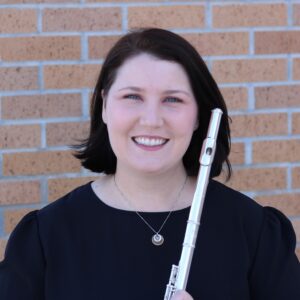 Charlene Cannon
Charlene Cannon
Band Director
Horizon High School
Winter Garden, Florida
1. Stay organized.
2. Be positive with students, parents, colleagues and administrators.
3. Don’t be afraid to ask for help!
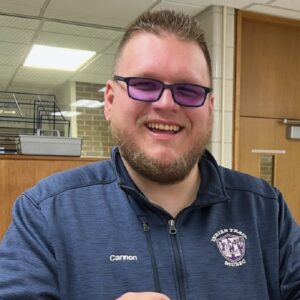 Raymond William Cannon
Raymond William Cannon
Director of Beginning Band
Addison School District 4
Addison, Illinois
1. Don’t be afraid to ask for help. There are many tricks and tips that other teachers are always willing to share to help you.
2. Build on a good foundation. Sometimes this means going back to square one. It may take some time, but the results speak volumes.
3. Be open to change. Real life and textbooks don’t always line up. You will learn a lot in your first year. Continue to listen and look for better ways to teach.
 Jena Combs
Jena Combs
Director of Musical Activities
Flora High School
Flora, Illinois
1. Believe in every student’s potential for success to foster a thriving music program. It’s OK to have big, grandiose ideas and goals — believing in students is how you achieve them. Be realistic, but always believe greatness is achievable for your students.
2. Love your job and your family. Establish a work-life balance from the beginning to prevent burnout especially during busy periods.
3. Build strong relationships with students and parents by showing genuine interest, maintaining regular communication and fostering a sense of community and support. These things all contribute to the long-term success of a music program.
 Jessica Corry
Jessica Corry
Band Director
Plank Junior High School
Oswego, Illinois
1. Be consistent. Band directors are notorious for trying to reinvent the wheel, but in my opinion, there isn’t much innovation to be done in the band directing world. However, the path to get to the end result is what matters. So, find out what works for your students and stick with it. See how the “best” directors get their groups to sound fantastic, play the right notes and the right time, in tune, and with a good tone.
2. Give yourself time, be patient. Our job is a daily grind. It has rewarding moments, but there are a lot of monotonous moments behind them. I was once told, “Every overnight success was at least 10 years in the making.” It’s true, I’ve lived it.
3. Find your village. There are a lot of fantastic music educators out there, and there are a lot who should not be educators. Find people who will help and build you up. Surround yourself with people who will be honest with you, while also making sure to keep you focused on the right things: the students.
 Mallory A. Dekker
Mallory A. Dekker
Executive Director and Instructor
Black Hills Studios of the Arts
Rapid City, South Dakota
1. Know that at some point you will have to advocate for your program, and you might be surprised to whom, so be ready and be prepared. Choose your advocacy argument wisely. Your program and your students’ music education are worth it.
2. You hear about mental health all the time — take precautions and set up a routine now. You, your family, your students will thank you later.
3. Try something new. Do so with support (family and/or friends) and a lot of research.
 Gillian Desmarais
Gillian Desmarais
K-12 Music Technology and Engineering
Harmony Learning Center
Maplewood, Minnesota
1. Building relationships with your students is key. Take time to listen to them and find ways to relate to music they like. Connection is essential to learning, and building trust and respect in the classroom should start there, too.
2. You can learn so much from the teachers in your school. Take time to observe them, or if that’s too much, try and catch up with them at the end of the day. I received some of the best teaching advice from my peers.
3. Be yourself! If your personality isn’t reflected in your teaching, you’re doing yourself a disservice. Find ways to let students know who you are, and they won’t be afraid to be themselves in front of you. You can show this through how you decorate your classroom, use jokes to engage students during lectures, wear fun and cheery colors, do dance brain breaks or come up with handshakes for every student. Let your classroom mirror your true self. It’ll be the kind of place where students will want to see their own reflections in, too!
 Jeff Driscoll
Jeff Driscoll
Music Teacher
Monroe Elementary School
Bartonville, Illinois
1. Be open to things the first year.
2. Don’t try to change the world, just get a sense of how the community and school are open to supporting your program and slowly morph that into what you want to see.
3. Remember, it’s never really your program until years down the line.
 Nicholas A. Fields
Nicholas A. Fields
Band Director
Edgewood City Schools
Trenton, Ohio
1. Remember it takes a while to build momentum.
2. As much as you have learned from everyone else, remember you will have your own unique teaching style, embrace it.
3. Always stay consistent and fair with your expectations.
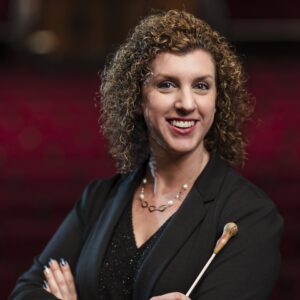 Allison Figueroa
Allison Figueroa
Assistant Band and Choral Director
Parkland High School
Allentown, Pennsylvania
1. You won’t be perfect, ever. Just keep learning and adjusting.
2. Students will respond much better if they know you truly care about them.
3. Let your personality come through in your teaching.
 Dennis Giotta
Dennis Giotta
Music Teacher
Southeast Local School District
Apple Creek, Ohio
1. Never underestimate your students — they are capable of more than you think if you find ways to connect with them and learn from them.
2. Do what is best for your students at all times. You don’t need to do what everyone else is doing. There are plenty of ways to make music meaningful and educational.
3. With so much to learn and do as a new teacher, it is easy to isolate yourself. Find time to meet with friends, talk to colleagues or find a network of people who you can talk to about work or personal things.
 Brad Hart
Brad Hart
Instrumental Music Teacher
Peter Johansen High School
Modesto, California
1. Have a vision that expands your musical community. For your students, include a wider array of offerings to bring more students into musical learning, and make sure that your musical selections are intentionally diverse. For yourself, find your own personal musical community so that you can develop relationships that will allow you to grow as a person, musician and educator.
2. Every student deserves the best teacher. Work to make sure you are their best teacher, not just a good director.
3. Work to create an environment driven by the music and the people who are making it. Engage your students with composers, with engineers, with stage crews, professionals and amateurs, community bands, honor groups and every way they can continue with music throughout their lives.
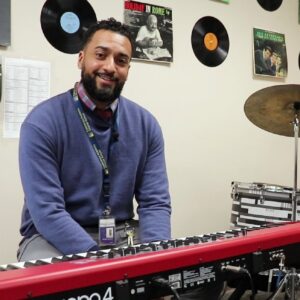 Miguel Hidalgo
Miguel Hidalgo
Music Teacher and Music Director
Esperanza Academy Charter School
Philadelphia, Pennsylvania
1. Never stop playing your primary instrument.
2. Always pull your instrument out and play alongside your students.
3. Create space for your students to explore their own musical preferences.

Dr. Richard Hutton
Assistant Professor of Choral Music Education and Assistant Director of Choral Activities
Boise State University
Boise, Idaho
1. There is so much to do — take the time to build positive relationships with your students and their families.
2. Err on the side of accessible rather than overly challenging literature. Ambitious first-year music educators notoriously over-program.
3. Collaborate! Form a “brain trust” with the choral colleagues in your area and through our professional organizations.
 Lily Ianaconi
Lily Ianaconi
9-12 Instrumental Music Teacher
Franklin Academy High School
Malone, New York
1. Have courage to try something new. It can be scary and daunting to take on a new opportunity or to try and create a new experience for your students when you only have the idea and vision.
2. Don’t hesitate to ask questions! I have had the wonderful opportunity to meet so many terrific and knowledgeable colleagues across New York state and the country who are always willing to share their ideas, expertise and experiences with me.
3. Find a healthy work-life balance. It’s important to strike a healthy balance between school and everything else.
 Dr. Jacquelyn Lankford
Dr. Jacquelyn Lankford
Assistant Professor of Trumpet
Mississippi State University
Starkville Mississippi
1. Collaborate! It is the most inspiring way to create and do things that nobody has done before. It is so easy to get stuck in your own little bubble, but when you combine your talents with those of others, you can truly do some extraordinary things with your career.
2. Leave your school! What I mean by this is go to conferences, competitions and anything else that puts you and your students into an environment where you get to be around people who do what you do. This is the best way to network, hear new music, and add to that inspiration by hearing new ideas and meeting new people.
3. Don’t be afraid to rattle some cages! There is too much of “this is the way it has always been done, and this is the way it always needs to be done” mentality. Though there is beauty in tradition, evolution must happen for us to remain relevant and to keep things interesting. We are so lucky to do what we do, and it is so important to not slip into the monotony of doing the exact same thing every day. Don’t be afraid to voice your ideas or to try something a little new or different.
 Christopher Lape
Christopher Lape
Orchestra Director
Upper Arlington High School
Upper Arlington, Ohio
1. Be flexible and give yourself grace. You won’t always get through everything you want to and sometimes you will have to improvise.
2. Take time to get to know your students. They have a lot to contribute to the community. When you invest in them, they’re more likely to invest in you and their learning.
3. Find opportunities to observe other music and non-music teachers. There’s a lot of great teaching and wisdom out in the universe.
 Kevin Longwill
Kevin Longwill
Music Industry Teacher, Director of Modern Music Makers (M3)
Abington School District
Abington, Pennsylvania
1. Authenticity is key. Students want to make music, and our job is to help them make music in whatever way makes the most sense.
2. Let the kids steer and have a voice and choice in what and how they pursue making music.
3. Don’t try to do too much too fast.
 Kimberly Kraft McLemore
Kimberly Kraft McLemore
Vice President of Education and Community Engagement
Nashville Symphony
Nashville, Tennessee
1. Give yourself a lot of grace. No educator had everything figured out during their first year of teaching.
2. Seek out veteran educators to help guide you and mentor you throughout your early years. These relationships are invaluable!
3. Network and collaborate with partner organizations in your city to connect your students to learning opportunities. These organizations often have the staff or capacity to help plan and coordinate programming or experiences for educators and students.
 Adam Murray
Adam Murray
Orchestra Director, Music Department Chair
Port Clinton City Schools
Port Clinton, Ohio
1. Demonstrating a skill requires proficiency, teaching a skill demonstrates mastery. Teach students to teach.
2. You can’t control events, but you can control your reaction.
3. When you’re in front of kids, you don’t have the luxury to panic. When serious problems happen in the classroom, take a deep breath and solve the problem. You’re the adult in the room now — congrats!
 Andrew Muth
Andrew Muth
Director of Bands and Director of Performing Arts
Westfield High School
Westfield, Indiana
1. It’s going to take time to get to where you want to be. Set attainable goals and celebrate when you achieve them.
2. Relationships are the most important part. Invest in knowing your staff, parents and students. Let them know that you care about their experience.
3. It is not about you! Take “I’ and “my” out of your vocabulary and focus on the “we.” Believe in the power of what can be achieved together.
 Alex Mutz
Alex Mutz
Director of Bands
Sam L. Martin Middle School
Austin, Texas
1. Never be afraid to ask for help. There is always room to grow and learn, so don’t be afraid to say, “I need help.”
2. Be kind to others and be social. Go out and meet other people in the field and make friendships with them. They can turn out to be some of the best decisions you’ve made.
3. Prioritize yourself. Take time off when you need to, focus on what you need as a person and make sure you are not letting yourself get overwhelmed.
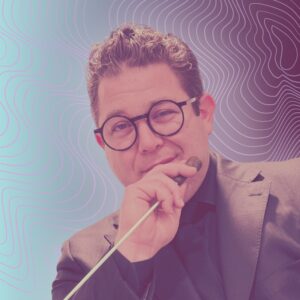 Christopher Noce
Christopher Noce
Director of Bands and Orchestras
Concord-Carlisle High School
Concord, Massachusetts
1. Be Open: Try new things. Invite mentors and colleagues into your rehearsals. Seek feedback from your peers and your students. Learn to take constructive criticism, accept help and be candid with your students. Allow students into the process.
2. Be Kind: To students, colleagues, families and yourself. You rarely know how much of an impact you are making at the moment, and kindness is a great place to start. Communicate clearly (“Clear is kind,” as Brené Brown writes in “Dare to Lead”). Be flexible when possible. Remember, we are always learning and growing — this is rewarding work, but it is hard work, and mistakes are part of the process.
3. Be There: So many of the folks I looked up to early in my career (and still do!) started their work in positions with struggling numbers and low achievement. It takes time to build something great, and most opportunities are not turn-key. You need to stick around to see things come to fruition.
 Allison Paetz
Allison Paetz
Vocal Music Teacher
Rocky River High School
Rocky River, Ohio
1. Expect a lot of yourself and from your students, and remember to be kind to both.
2. Sleep, drink water and take a sick day if you need it.
3. Don’t forget that you’re the one who decides if you’re going to have fun in the classroom. If you go into a class determined to enjoy yourself while you teach, your students will see that and will want to join in the fun.
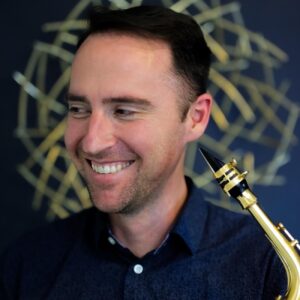 Dr. Stephen C. Page
Dr. Stephen C. Page
Associate Professor of Saxophone and Director of Undergraduate Studies
The University of Texas at Austin Butler School of Music
Austin, Texas
1. Engage with the community around you. Teachers, administrators, parents, students and beyond, will all help you.
2. Love the process of what you do as you aim toward your goals. Work at them, and work toward them, but don’t force it. Everything comes in due time.
3. Have/start a hobby and make time to regularly enjoy it. We are whole individuals, and interests outside our work will help us find balance and enhance what we can give to all areas of our life.
 Cale Patton
Cale Patton
Music Teacher
Gillespie Technology Magnet Cluster School
Chicago, Illinois
1. Creativity is about going where the spirit takes you and not always knowing the outcome. Today’s academia, even within the arts, is all about end goals, which can undermine true creativity. I challenge a first-year music educator to trust their instincts and to jump right in, even if they aren’t sure where it might lead. Listen to your heart, listen to your students and, most importantly, have fun and dance.
2. The hopes and dreams of students don’t always look like the music education we learned about in college. Don’t be afraid to admit your mistakes and failures to the kids. Be you! Your students will respond best to your authenticity.
3. Listen for what activities and things your students like, but don’t pretend that’s your life, too. Don’t shy away from sharing your own musical tastes, interests and endeavors. It inspires students to think outside the box, try new things and take creative risks in every avenue of life.
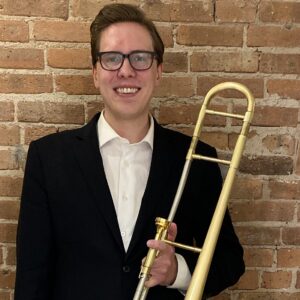 Ben Pedersen
Ben Pedersen
Director of Bands
Foreman College and Career Academy
Chicago, Illinois
1. Be your authentic self and don’t head into the classroom with a preconceived notion of what a music educator should sound like.
2. Never stop honing your musical skills, including arranging, which is a vital skill for differentiation in music ensembles.
3. Model great practice habits, they will inspire your students.
 Kyle D. Phillips
Kyle D. Phillips
Band Director
Princeton High School
Cincinnati, Ohio
1. Take every opportunity to grow and learn. Lessons can come from anywhere — from your students, your colleagues, former educators, etc.
2. Don’t give up! It does get easier.
3. Be your students’ biggest fan. Go to their athletic events, learn who they are outside of the music room and celebrate every success.
 Matthew Rupert
Matthew Rupert
Co-Founder, Clarinet/Piano Faculty, Little Mission Studio
Co-Founder, President of the Board, Make More Music Foundation
San Francisco, California
1. Be giving of your time and always support your colleagues. I have kept in touch with a number of my colleagues from school, and we have a supportive network where we share teaching tips, challenges and solutions, and generally support and cheer on one another in all of our endeavors.
2. Never stop learning and being curious. Be eager to explore new teaching methods, new repertoire or composers you never learned about in school, and new technology to help you become better at your craft.
3. Teach more than music. Remember that learning music is so much more than learning notes on a page. Music students learn how to problem-solve, collaborate and communicate, as well as how to show creative expression, individuality, acceptance and more! Create a musical space where students can grow into great humans, who also happen to be good at music.
 Julie Anne Russell
Julie Anne Russell
Orchestra Director
Blythewood High School
Blythewood, South Carolina
1. Stick with it — yes, there are hard times and weeks, but to see students go from Twinkle to St. Paul is pretty amazing.
2. Surround yourself with people who are smarter than you — ask questions and be receptive. I’m here because of the people who helped and encouraged me.
3. Just go for it. Send the email asking about a crazy idea, get together and dream of big projects, and don’t be scared to pursue big dreams because people may say no … because, a lot of times, they say yes.
 Kacee Sanders
Kacee Sanders
Band Director, DuPont Hadley Middle School
Executive Director, Southeastern Women In Music Symposium
Tennessee
1. If you don’t know the answer, ask someone. The network of music educators I have found in Metro Nashville Public Schools is a resource I wish I had during my first year of teaching. Speaking for all educators, we want to see you succeed. While everyone’s school situation may be different, having a community of colleagues to collaborate with is comforting and humbling. If you do not teach in a large district where you have many music peers to collaborate with, then join and connect with your regional music organization.
2. Find something that brings you joy outside of music. As musicians and teachers, we pour so much of our identity into music. While this is a huge part of what we do, be sure to allow yourself to explore other things. Personally, I have found maintaining a collection of house plants to be a great escape.
3. Give yourself some grace. You will make mistakes. The most important thing you can do is learn from that experience. Grant yourself the ability to forgive yourself, learn the correct answer and do better. No one walks into the classroom for the first time with all the answers (see tip #1).
 Dr. Jessie M. Vallejo
Dr. Jessie M. Vallejo
Associate Professor of Ethnomusicology
California State Polytechnic University, Pomona
Pomona, California
1. Even if the first few years might be the hardest in terms of teaching or classroom management, it is often the time you remember the most. Your first classes of students will change you as a teacher. Don’t let the early challenges discourage you.
2. Find ways to share your enthusiasm for what you teach with your students and colleagues. Something that is fun can still be important, challenging and meaningful.
3. Naps are essential! Stay hydrated and take care of your health.
 Dr. Jessica Vaughan-Marra
Dr. Jessica Vaughan-Marra
Associate Professor of Music and Coordinator of Music Education
Seton Hill University
Greensburg, Pennsylvania
Instead of THREE tips I have a three-word tip: Find content-specific mentors. School districts will often provide a mentor for new teachers. This point person can be helpful for navigating the day-to-day questions about the school routines and culture. However, music education majors enter the profession with a breadth of pedagogical understanding while also needing continued professional development and support. Many organizations like state-level MEAs and national organizations such as ASTA have content-specific mentoring options for new music teachers. Continued professional development through participating in workshops, conference attendance and pursuing advanced degrees moves the mentoring a step further and helps new music teachers find a community of learners and build upon their professional social connections across the greater music education community.
 Dr. Paulina Villarreal
Dr. Paulina Villarreal
Assistant Professor of Voice
University of Memphis, Rudi E. Scheidt School of Music
Memphis, Tennessee
Founder and Artistic Director, Cantos Para El Mundo
1. Be a student for life. As music educators, we can’t afford the luxury of being complacent. We must remain curious and continue learning.
2. Videotape your teaching as often as possible. Take time to look back at those videos and make improvements!
3. Inspire but also challenge your students, regardless of their technical development.
Check out tips for first-year music teachers from the 2026 “40 Under 40,” 2025 “40 Under 40,” 2023 “40 Under 40,” 2022 “40 Under 40” and 2021 “40 Under 40” educators for more invaluable advice!
Top photo by: PATPITCHAYA / Adobe Stock















